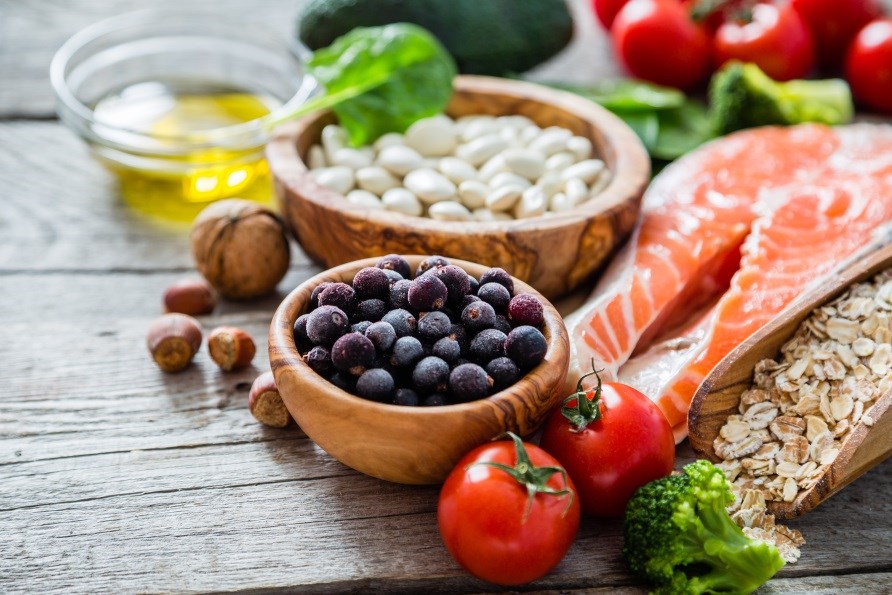Brain, memory and concentration
The brain, along with the nervous system, controls our entire body, and even though the brain only makes up 2% of the body weight, about a quarter of all the energy we use goes into keeping the brain going. In this article, we give you a rundown of the best food for this important organ.

Great food to keep the brain going.
Oily fish AND omega-3
Most people know that the polyunsaturated omega-3 fatty acids are good for the heart and blood vessels, but what many of us don’t think about is that good cardiovascular health also has a positive effect on the brain. The omega-3 fatty acids help to make the blood more fluid by reducing the ability to clot. This reduces the risk of blood clots, and this is positive for both the heart and brain.
The omega-3 fatty acids EPA and DHA are also important for other reasons. Among other things, DHA contributes to the normal functioning of the brain's neurons and is also needed for a normal growth rate in children as well as for the development of the brain and eyes in fetuses and children. Omega-3 is also necessary for the body to regulate blood pressure and kidney function and for it to be able to repair cells. In order for us to get enough omega-3, we should eat seafood at least three times a week, both fatty and lean. Given the many health effects of omega-3 fatty acids, it is therefore important to meet the body's need for these fatty acids and also balance them with an intake of omega-6.
Tip! A vegetarian alternative for omega-3 intake is flaxseed oil.
Whole grain products
In order for a product to be considered whole grain, all parts of a grain of grain must be included, regardless of whether it is seeds or flour. Whole grain products are broken down slowly in the body, which means they cause a slow rise in blood sugar. This is positive for several reasons, not least for the brain. The brain is dependent on carbohydrates (glucose) to be able to perform and, unlike the rest of the body, the brain cannot use the fat reserves as an energy source when the body has run out of carbohydrates. Instead, the body must begin producing ketones to supply the brain with energy. The brain needs just 100 grams of glucose a day to function optimally, and performs best if the supply of glucose is even throughout the day. By choosing whole grain products, the blood sugar curve is even and stable, which means that the brain gets a continuous supply of energy (glucose).
If you instead eat fast carbohydrates such as white flour and sugar, the blood sugar curve will rise quickly and then fall again. This results in an uneven curve and an uneven supply of energy to the brain. The result is that the brain's performance varies greatly during the day and in practice you notice this in the form of difficulty concentrating, for example.
Good sources of whole grains:
- Wholemeal pasta
- Crispbread
- Brown bread
- Whole grain rice
- Oats
- Rye flakes
- Wheat berries
Blueberries
Berries are often referred to as real superfoods, i.e. a food with highly nutritious content. Perhaps unsurprisingly, blueberries have also been shown to have positive effects on the brain. More specifically, it appears that blueberries can improve learning ability, balance, coordination and short-term memory. In addition, blueberries contains anthocyanidins, carotenoids and flavonoids that are positive to maintain vision. So go foraging and pluck as much of this colourful berry as you can, or choose a supplement with blueberry extract.
Nuts
Nuts are rich in fat and also contain a lot of the fat-soluble vitamin E. Vitamin E is said to reduce the risk of cognitive loss, especially in the elderly. As we mentioned earlier, the healthy fats are also positive for both the heart, vessels and brain.
In addition to vitamin E, nuts are also rich in vitamins and minerals along with a lot of protein. But remember not to eat too many, as nuts, despite their small size, are very energy-rich. If you are allergic to nuts, vitamin E is also found in green leafy vegetables, eggs, asparagus, olives and brown rice.
Broccoli
This green vegetable contains, among other things, a substance called sulforaphane, which is believed to have a strengthening effect on the blood-brain barrier, which is what separates the circulating blood from the fluid in the brain. This barrier provides very important protection for the brain and helps to prevent, for example, bacteria and other harmful substances from entering the blood and into the brain. Broccoli is also filling and low in calories, so there are many reasons to keep broccoli as a refrigerator staple.
Tomatoes
Tomatoes are rich in the antioxidant lycopene, which, just like other antioxidants, helps protect the body against free radicals and oxidative stress. It is believed that free radicals can cause many different diseases, including dementia and cardiovascular disease. Eating plenty of antioxidants is therefore a good idea, not just for the sake of the brain but for the whole body. Lycopene is released when tomatoes are heated, so feel free to enjoy tomato soup or oven-baked tomatoes.
Avocado
Avocado and avocado oil are rich in fat in the form of useful, unsaturated fatty acids. This type of fat helps keep cell membranes mobile and flexible. Avocados contain a lot of monounsaturated fatty acids such as omega-9, which are believed to be able to protect the brain's nerve cells. In addition to this, the monounsaturated fatty acids also help to keep blood pressure low and to keep the blood flowing easily. The fact that the blood flows easily through the veins is positive for the whole body, not least the brain, which needs large amounts of nutrition and oxygen to function optimally. Avocados also contain plenty of the mineral potassium, which according to researchers can help protect against high blood pressure and strokes. A tip is to slice the avocado and lay it on a slice of wholemeal bread along with sprouting and a little black pepper. This way, you get both whole grains and nutrients from the avocado and the sprouting.
Sage
Sage is a tasty herb that has traditionally been used as a medicinal plant. Researchers have studied the properties of sage even in modern times, and it has been found that the herb appears to have positive effects on both memory and learning ability. This is because sage is believed to help inhibit the breakdown of the neurotransmitter acetylcholine. Acetylcholine is the neurotransmitter involved in memory and learning.
Eggs
Eggs are rich in most nutrients, vitamins and minerals. In addition to plenty of protein, eggs also contain a lot of vitamins B and E as well as the minerals iodine, phosphorus, zinc and selenium. In addition to these substances, eggs also contain choline, a B-vitamin-like substance that is needed for the body's production of acetylcholine. Acetylcholine is, as mentioned above, the neurotransmitter involved in memory and learning and choline is often found in dietary supplements for memory.
Dark chocolate
Dark chocolate doesn’t just taste good, it also has several useful properties thanks to its high content of cocoa. According to researchers, cocoa has several positive effects on the brain, including our cognitive behaviour, not least in the elderly. Cocoa contains flavonoids, a type of antioxidant, and it is the content of these that is believed to be behind the positive effects. Researchers have noted that after consuming dark chocolate, the blood flow to the grey mass in the brain increases, and it is therefore speculated that cocoa flavonoids may be beneficial for people with dementia or those who have suffered a stroke (1). It is not clear whether dark chocolate also has a preventative effect, but if you like dark chocolate, you can most likely enjoy a piece with a clear conscience.
References
[1] Fisher ND, Sorond FA, Hollenberg NK. Cocoa flavonols and brain perfusion. J Cardiovasc Pharmacol. 2006; 47 Suppl 2:S210-4.

